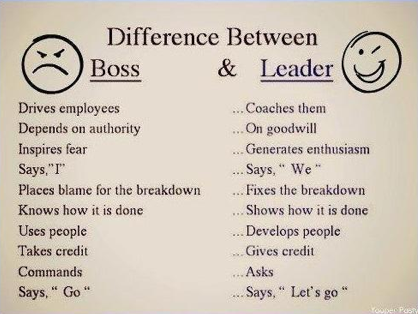Boss. Leader. Manager.
Kick enough goals, win enough brownie points, and you'll frequently progress up your career ladder to any one of these positions. These are often the terms given to you when you take on the management of not just a task, but a project that involves people, personalities and project goals. Each of these terms are also interchangeable right!?
The distinction between doing these sorts of jobs and leaving an inspiring mark determines your capabilities as not just a boss, but as a leader. As newly appointed head honcho, you've only won half the battle – Engaging a team, inspiring the networks that make your business tick and having the business nous to build the strategy to make it happen (and work!) is how you'll win the war. No small task.
The following was shared on my LinkedIn network this week, generating significant conversation and support around the key differences between managers and leaders:
This got me thinking about the progress from do-er to leader. Oftentimes, its our capabilities in our craft that gets us progressed to taking on larger projects, and the responsibilities of managing an individual or team of people. Some lack, or are not given the opportunity to learn and develop the skills of leadership; often getting bogged down in the details of the task, and missing the "big picture"implications of their direction and decisions in project and people management. Sometimes this happens through rapid promotion, or more often through "invisible promotion", where the inclusions of a job's responsibilities expand without the official job description changing.
The Peter Principle – When things go Wrong; a study on management and workplace psychology developed by USC's Dr Laurence J Peter in the 60s, went so far as to theorise that in workplace hierarchy (i.e., any/every type of organization): -"every employee tends to rise to his level of incompetence". Essentially, this idea illustrates the difficult trend we continue to see in global business where professionals rise to a point beyond their capability, where they essentially become inept and are unable to do their roles effectively. The result is often a fractured team and under-performing organisation where managers are promoted, and a culture of leadership and accountability is not fostered. Teams feel uninspired, demotivated and like a cog in a machine. This poses not only a major challenge for big business, but also the fast-growing contingent of start-ups working their way up into the mainstream as their ideas and business viability grow from concepts to living, breathing revenue generators and places of work. The next generation of business owners, need to build teams and leaders amongst them that guide and inspire to take their businesses to the heights they dream of.
How can businesses ensure its brightest stars see the big picture, work for the greater good and inspire their teams to greater heights as leaders, rather than just "act like a boss and get the job done"? I believe recognition of a few key factors are at play in determining an organisation's leadership strategy and capability:
1. Not everybody is designed to be a leader
Remember the old adage that says leaders are born, not made? Great leaders need to have the people skills to connect, empathise and inspire a team, through a combination of both confidence and emotional maturity. Couple with that the business smarts to understand what makes it tick, and the strategy required to build it and take it to the next level, and its clear that the requirements of a leadership role are significant. Strong technical or executional ability will not always make a great leader. Ensure leaders have these emotional, people and business strategy skills to lead teams and business units.
2. Leadership needs to be transformational, not transactionary
In a post-GFC business environment, short term gains and being seen to respond quickly to tasks or challenges at hand is seen as "effective". In reality, effectiveness comes from consideration, reflection and action based on strategy and forward thinking. A leader is one who considers the goal, stops, checks and reflects on the team's capabilities and resources to deliver, and guides on execution based on these insights. Foresight and a long-term strategic approach builds strength for the long term, not just a quick win for right now.
3. Give your brightest stars the tools and capabilities to lead
Invest in your people and reap the rewards. Professional growth should be more than a process of "corporate osmosis" where skills are acquired on the job, and developed on the frontline. Whilst many skills are learned in the day-to-day of a role, good long-term leadership strategies identify the strengths and weaknesses of leaders and offer structured mentorship, training and development to bridge skills gaps and elevate skills/capabilities. A stronger, more skilled team will deliver rapid return on investment.
4. Inspire or expire
Vision is what separates good organisations from great organisations. Leaders with a vision and goal for their team or organisation already have the seeds to grow an engaged and positive workforce, united in its goal to succeed. Passive or neglectful management will do just the opposite.
Sarah Creelman is a PR pro with over 12 years of experience across the digital, technology, and media industries. Her skills in crafting, creating, and changing the way communications are delivered by an organisation stems from her experience supporting brands including CBS Interactive, Electronic Arts, Samsung Electronics, 3 Mobile, Fruit Ninja developers Halfbrick, Commonwealth Bank’s digital banking services and more. Her blog, Conversation by Design, reviews and tracks the way communication connections are happening in a new, more connected social media age. Read more of her thoughts on leadership here.













